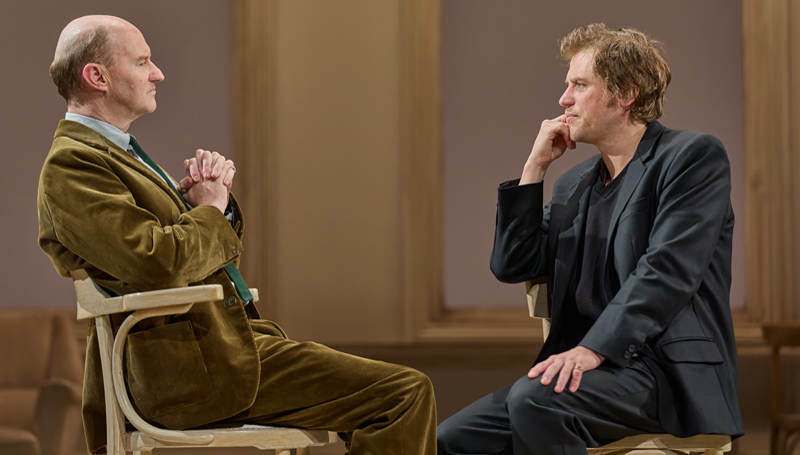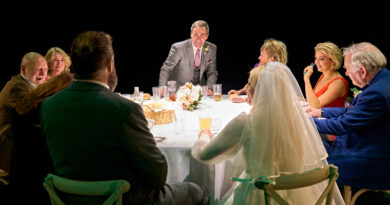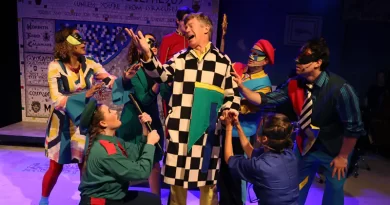“The Motive and the Cue” at Noël Coward Theatre
Jeremy Malies in the West End
24 December 2023
Plays set in a rehearsal room as actors prepare is a popular form and began with a Restoration piece, The Rehearsal by George Villiers. The genre continued notably through Jean Anouilh’s play of the same title (1950), in which bored aristocrats prepare a Marivaux comedy, and Timberlake Wertenbaker’s Our Country’s Good (1988). Most recently, Jamie Lloyd has used the approach in his production of The Seagull with minimal set at the Harold Pinter Theatre in 2022.
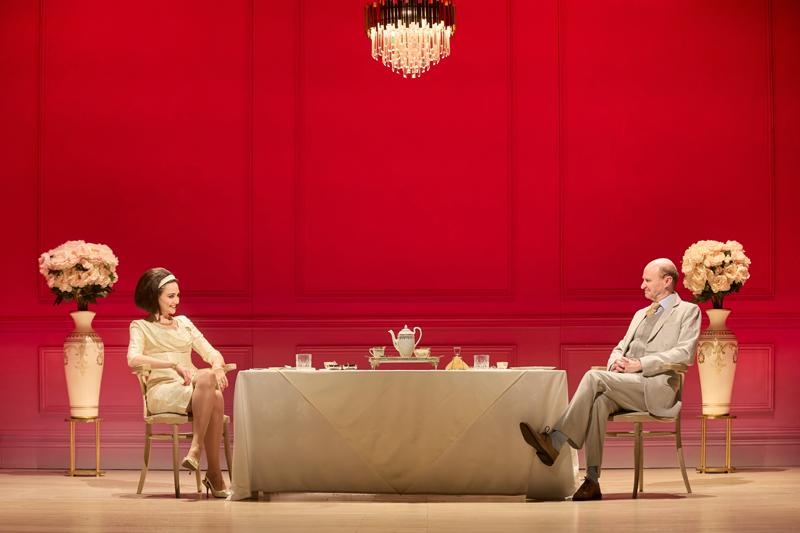
Tuppence Middleton and Mark Gatiss.
Photo credit: Mark Douet.
Now, transferring from its world premiere at the Lyttelton, National Theatre, Jack Thorne’s brilliant piece with direction by Sam Mendes takes us to the (real-life and available in its entirety on YouTube) 1964 production of Hamlet on Broadway with Richard Burton in the title role under the direction of Sir John Gielgud.
After comet-like virtuosity including playing Hamlet hundreds of times, Gielgud’s career (he was now 60) was in the doldrums and Mark Gatiss who plays Sir John confides this to an assistant while he and Burton (Johnny Flynn) simmer down after a row. Burton, by contrast, was flourishing having earned $250,000 the previous year as Mark Antony opposite his now wife Elizabeth Taylor in Cleopatra. Taylor (played here by Tuppence Middleton) is much in evidence and part of the dramatic tension is a tussle with the production team over whether she can kibbitz at rehearsals, a conflict in which there is only ever going to be one winner.
Thorne’s script has Burton ask Gielgud whether Hamlet really liked his father and (earlier) while the company is rehearsing the scenes on the ramparts, whether the prince truly wants his father’s ghost to visit him. These are massive questions and I marvelled at the textual criticism that sees Thorne interpret “To be or not to be” as Hamlet debating whether he has the tenacity to see though the next phase of Denmark’s history which will probably see civil war between his family and followers of Fortinbras. Flynn responds to the subtle task of reining in early exuberance in the form of what Gielgud derides as trumpet or clarion calls that should only be used in the last resort. It’s a convincing portrayal of an actor embracing a role under a mentor who can be both inspirational and an irritant.
I learnt a lot and, initially puzzled as to why Liz Taylor should be quoting the Old Testament fluently and at length, began to understand her more as Middleton describes her character’s stifling upbringing by Christian Scientists. Sir John asks Taylor to reflect on how sad it is to have done one’s best work at the age of 25, describing a 1929 season at the Old Vic when he played Romeo, Richard II, Mark Antony (synergy with Burton there), and Orlando. Taylor flashes back by asking him to reflect on what it is like to have done your best work aged 12 (when she starred in National Velvet). Later, Taylor creeps onto the stage proper and Middleton blazes her way through Juliet’s “Gallop apace, you fiery-footed steeds …” It’s a “heavenly eloquence” to quote from the close of the speech.
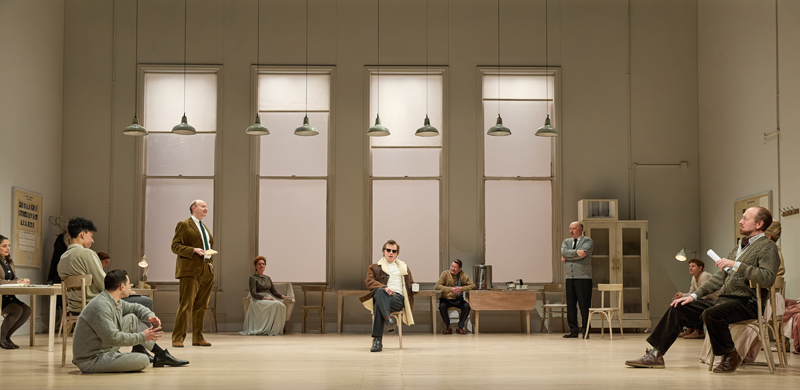
The ensemble.
Photo credit: Mark Douet.
There is much successful visual humour with Mendes’s deft touch again to the fore in combination with direction for the West End run by Zoé Ford Burnett. Gatiss inspects Taylor’s breasts during a breakfast meeting. As the legendary eagle-like nose emerges from her cleavage, he says that while it may not bring him to a state of arousal he should be regarded as a good judge of such things.
Luke Norris as William Redfield (who is playing Guildenstern) gives his own pitch-perfect Gielgud/Gatiss impersonation when narrating another meeting. A competent character actor and jobbing newspaper columnist, Redfield’s Letters from an Actor supplied Thorne with much of his material. Middleton also contributes to the mimicry stakes as she re-creates Burton’s strong consonants and trilled ‘r’s while imitating him.
I’ll admit that I sighed audibly when realizing that Thorne had made the predictable decision to have Gielgud invite a male prostitute (played by Laurence Ubong Williams) to his hotel. But the treatment in the dialogue (as well as Mendes’s physical handling of it) is tender and full of surprises. There is a wonderful gag about Gielgud’s propensity to blub regularly and profusely. (“Bladder too close to the eyes!”)
Costumes by Katrina Lindsay evoke the period, be they the black turtlenecks that are used both as civvies and for the play by several male actors as well as the women’s geometric shift dresses and capri trousers.
There are many walk-ons but Thorne fleshes out enough supporting roles to make the rehearsal cast credible as a group. Ryan Ellsworth as the Player King helps Flynn/Burton tease out the meaning of Hamlet’s advice to the players. For sheer bravura, Gatiss’s version of this as a primer for Burton is perhaps the highlight of the evening. Later we will learn (through the surtitles/captions that are a feature of Es Devlin’s set) that Sir John played Hamlet on this very stage. I doubt if I was the only person to swallow very hard when learning this. The captions are memorable as they hurtle through the days of the rehearsal process and feature quotes from the text that are apposite to the off-stage dramas we are seeing.
Criticisms? A large-scale party scene struggles under unimaginative blocking and over-crowded stage. And the closet scene in which (given the rehearsal nature of the production) a clothes rack is used as the arras also floundered. Here, the problem was Allan Corduner’s physical comedy as Polonius failing to ignite.
I wondered if Burton and Taylor’s bedroom conversation might have sparkled more. Both were known to be witty, with Taylor’s parents being part of Anglo-American high society and Burton impressing his tutors during a six-month stint at Oxford University before he left to join the Royal Air Force as a navigator in 1943. Thorne might have given more weight to the fact that Burton had first played Hamlet 11 years before in Edinburgh to positive notices with critics praising him for being a restless, somewhat sullen but eminently logical prince.
This is not just a metatheatrical play, it’s a theatre person’s play, although you could enjoy it with any or no grasp of the background. Layer upon historical layer opens up as Gielgud mentions to his sex-worker acquaintance that there had indeed been an “incident” relating to cottaging, a real-life sequence of events in 1953, which prompted former Evening Standard theatre critic Nicholas de Jongh to write the excellent 2008 play Plague Over England in which Michael Feast played Gielgud. We learn a lot about Gielgud’s attitude to the unseen Olivier, with Gielgud being embittered that Sir Laurence has become synonymous with Hamlet through his film project but only played the part for real on one brief run in 1937.
Music is by London-born composer and jazz pianist Benjamin Burrell whose chromatic improvisations between scenes made me think André Previn’s shade had floated into the theatre. These give way at the close to a Bach fugue as Flynn grabs Yorick’s skull and for the first time we are behind the scenes rather than in the rehearsal room or observing actors on the apron of the stage.
Flynn is convincingly explosive as he repeatedly refuses to take direction on individual lines or couplets from Gielgud. But he is happy to be steered through the arc of the big monologues. He is also credible, detailed, and vulnerable when recalling his miner father and a teacher/foster parent who took him to see Gielgud in his teens. Gielgud gives Burton so much interesting advice that the production will surely have made people want to go off and direct Hamlet using what we have been told here.
And the title? It’s a quote from the play and comes from Hamlet’s “O, what a rogue and peasant slave” soliloquy. Sir John explains to Burton that formative life events teach us moral lessons (motive or reason) and subsequent minor incidents engender passions that trigger us to take a course of action (cue) based on the larger lesson. Now here’s an idea. What price on Johnny Flynn to actually play Hamlet based on the many line readings here? At the close, Gielgud confesses to Taylor that his life has been largely confused and only while on stage have there been brief moments of clarity. There is clarity in abundance here. Outstanding.

